Business Outsourcing Functions: Advantages, Disadvantages Analysis
VerifiedAdded on 2020/03/04
|9
|2407
|44
Report
AI Summary
This report delves into the multifaceted world of business outsourcing, examining its advantages and disadvantages. It begins by defining outsourcing and its growing trend among companies, highlighting its role in allowing businesses to focus on core activities. The report then analyzes the objectives and scope of outsourcing, emphasizing its potential to reduce costs, increase flexibility, and improve service quality. The literature review explores various aspects of outsourcing, including the importance of choosing reliable partners, establishing legal contracts, and fostering trust. Furthermore, the report discusses the benefits of outsourcing such as cost reduction, concentration on core activities, increased flexibility, and enhanced quality of service. However, it also addresses the potential drawbacks, including job losses, quality issues, customer resistance, security risks, and ethical concerns. The conclusion summarizes the key findings, emphasizing the importance of carefully considering both the advantages and disadvantages of outsourcing to make informed strategic decisions. The report also includes a list of references and an appendix.
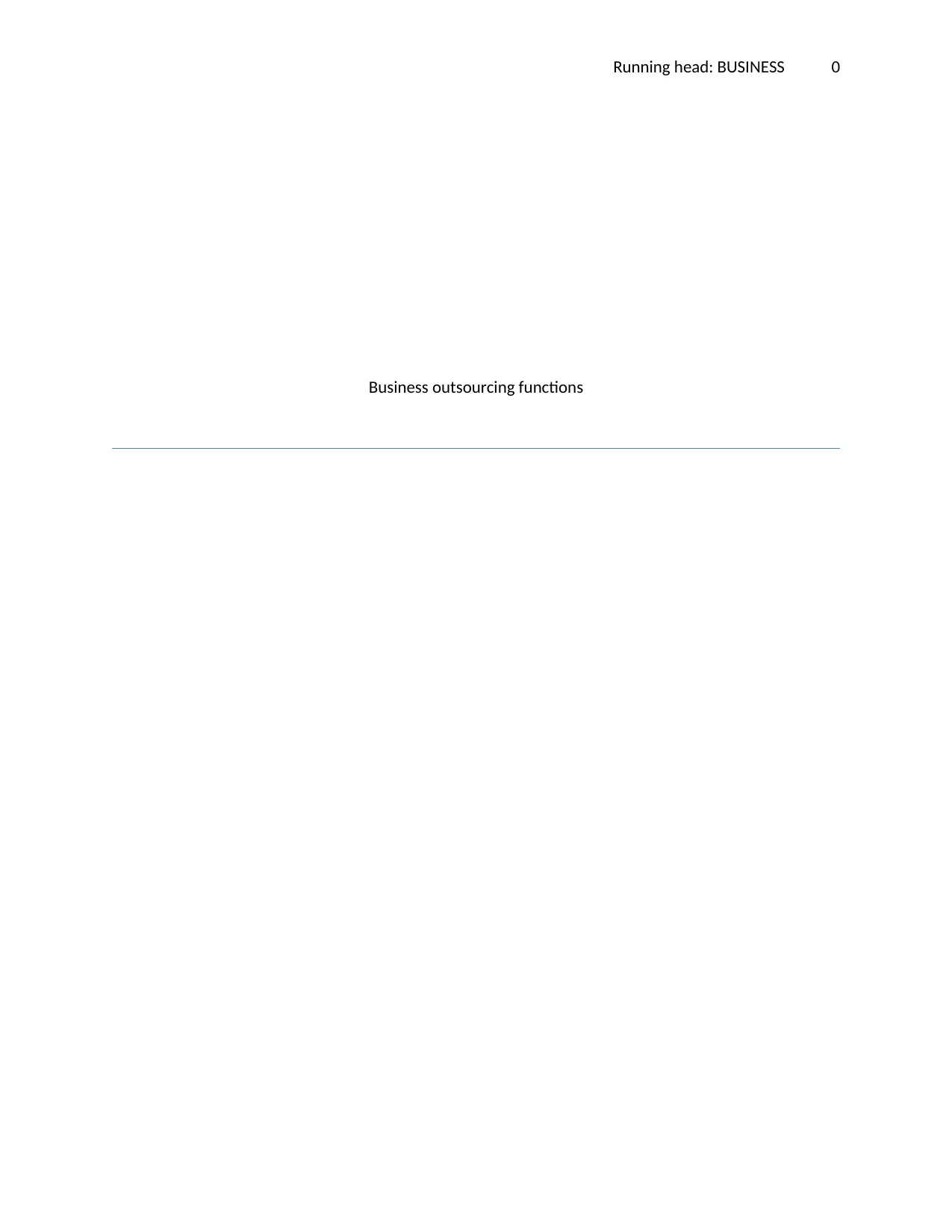
Running head: BUSINESS 0
Business outsourcing functions
Business outsourcing functions
Paraphrase This Document
Need a fresh take? Get an instant paraphrase of this document with our AI Paraphraser
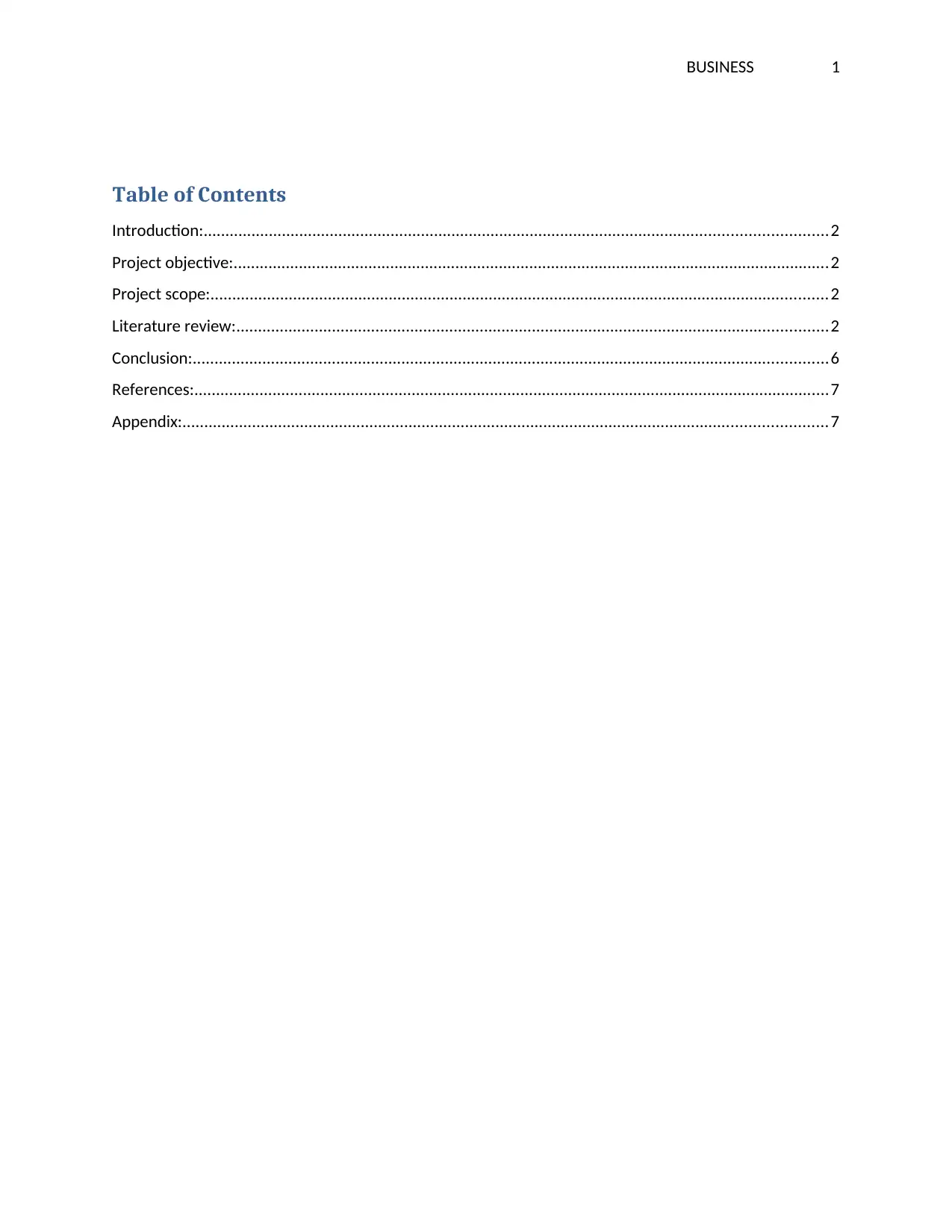
BUSINESS 1
Table of Contents
Introduction:...............................................................................................................................................2
Project objective:.........................................................................................................................................2
Project scope:..............................................................................................................................................2
Literature review:........................................................................................................................................2
Conclusion:..................................................................................................................................................6
References:..................................................................................................................................................7
Appendix:....................................................................................................................................................7
Table of Contents
Introduction:...............................................................................................................................................2
Project objective:.........................................................................................................................................2
Project scope:..............................................................................................................................................2
Literature review:........................................................................................................................................2
Conclusion:..................................................................................................................................................6
References:..................................................................................................................................................7
Appendix:....................................................................................................................................................7
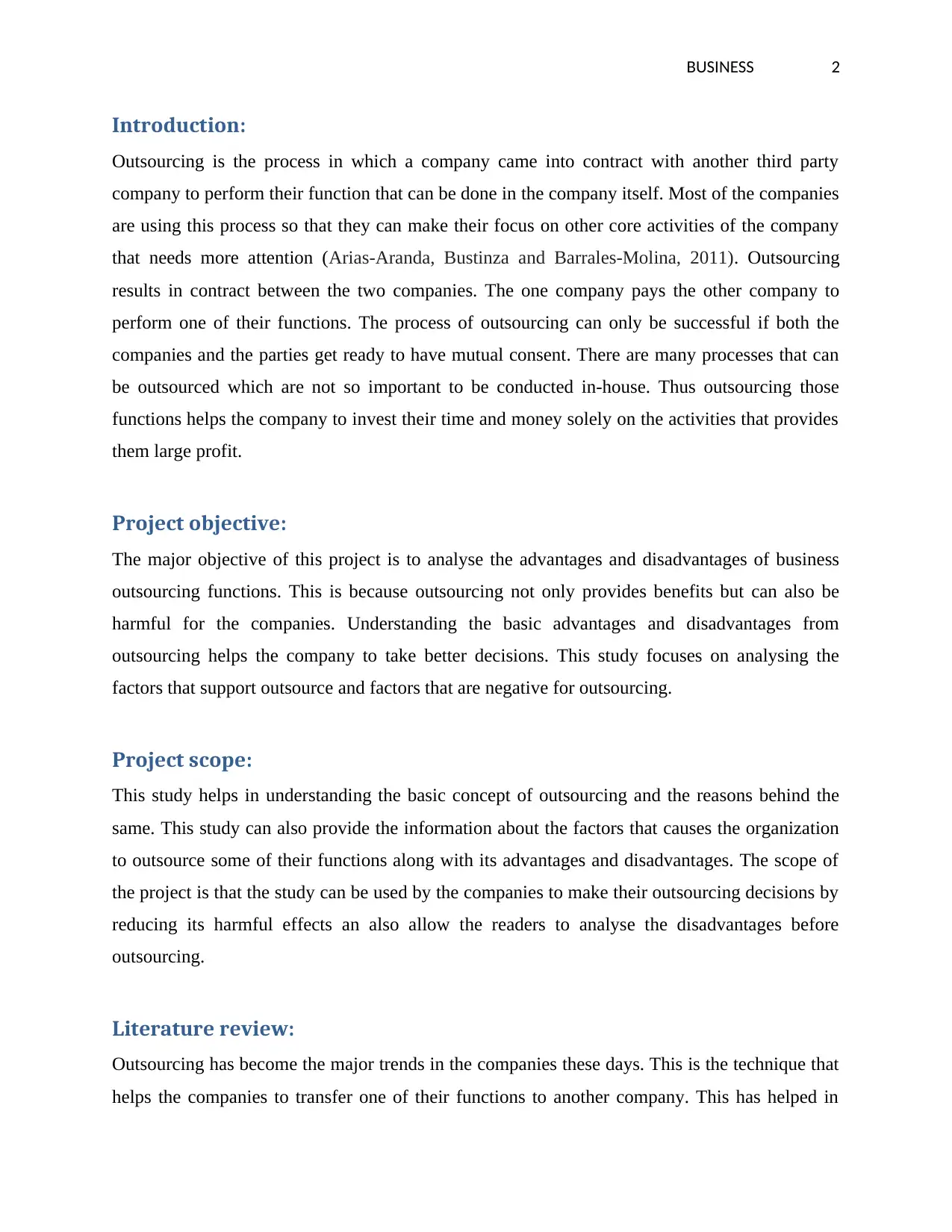
BUSINESS 2
Introduction:
Outsourcing is the process in which a company came into contract with another third party
company to perform their function that can be done in the company itself. Most of the companies
are using this process so that they can make their focus on other core activities of the company
that needs more attention (Arias-Aranda, Bustinza and Barrales-Molina, 2011). Outsourcing
results in contract between the two companies. The one company pays the other company to
perform one of their functions. The process of outsourcing can only be successful if both the
companies and the parties get ready to have mutual consent. There are many processes that can
be outsourced which are not so important to be conducted in-house. Thus outsourcing those
functions helps the company to invest their time and money solely on the activities that provides
them large profit.
Project objective:
The major objective of this project is to analyse the advantages and disadvantages of business
outsourcing functions. This is because outsourcing not only provides benefits but can also be
harmful for the companies. Understanding the basic advantages and disadvantages from
outsourcing helps the company to take better decisions. This study focuses on analysing the
factors that support outsource and factors that are negative for outsourcing.
Project scope:
This study helps in understanding the basic concept of outsourcing and the reasons behind the
same. This study can also provide the information about the factors that causes the organization
to outsource some of their functions along with its advantages and disadvantages. The scope of
the project is that the study can be used by the companies to make their outsourcing decisions by
reducing its harmful effects an also allow the readers to analyse the disadvantages before
outsourcing.
Literature review:
Outsourcing has become the major trends in the companies these days. This is the technique that
helps the companies to transfer one of their functions to another company. This has helped in
Introduction:
Outsourcing is the process in which a company came into contract with another third party
company to perform their function that can be done in the company itself. Most of the companies
are using this process so that they can make their focus on other core activities of the company
that needs more attention (Arias-Aranda, Bustinza and Barrales-Molina, 2011). Outsourcing
results in contract between the two companies. The one company pays the other company to
perform one of their functions. The process of outsourcing can only be successful if both the
companies and the parties get ready to have mutual consent. There are many processes that can
be outsourced which are not so important to be conducted in-house. Thus outsourcing those
functions helps the company to invest their time and money solely on the activities that provides
them large profit.
Project objective:
The major objective of this project is to analyse the advantages and disadvantages of business
outsourcing functions. This is because outsourcing not only provides benefits but can also be
harmful for the companies. Understanding the basic advantages and disadvantages from
outsourcing helps the company to take better decisions. This study focuses on analysing the
factors that support outsource and factors that are negative for outsourcing.
Project scope:
This study helps in understanding the basic concept of outsourcing and the reasons behind the
same. This study can also provide the information about the factors that causes the organization
to outsource some of their functions along with its advantages and disadvantages. The scope of
the project is that the study can be used by the companies to make their outsourcing decisions by
reducing its harmful effects an also allow the readers to analyse the disadvantages before
outsourcing.
Literature review:
Outsourcing has become the major trends in the companies these days. This is the technique that
helps the companies to transfer one of their functions to another company. This has helped in
⊘ This is a preview!⊘
Do you want full access?
Subscribe today to unlock all pages.

Trusted by 1+ million students worldwide
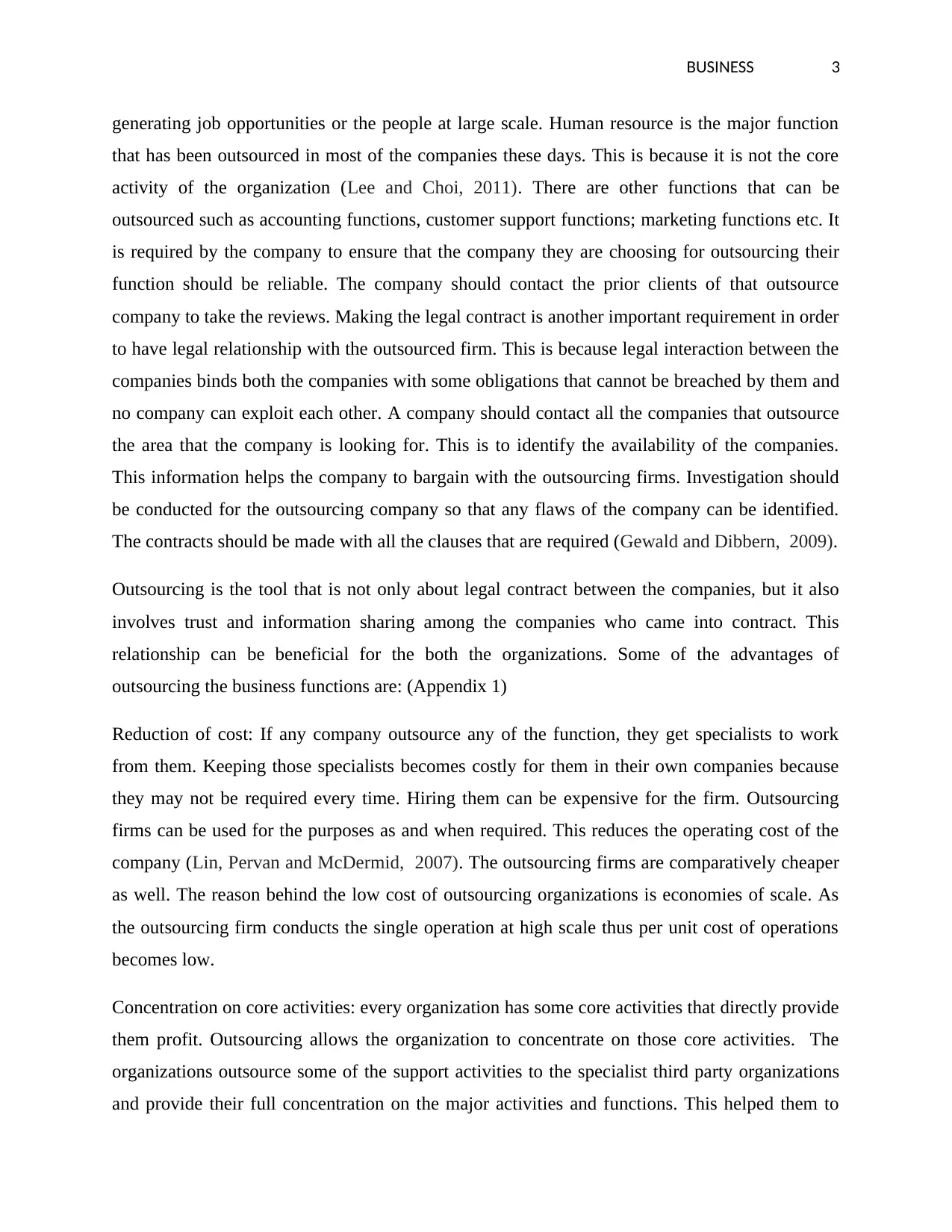
BUSINESS 3
generating job opportunities or the people at large scale. Human resource is the major function
that has been outsourced in most of the companies these days. This is because it is not the core
activity of the organization (Lee and Choi, 2011). There are other functions that can be
outsourced such as accounting functions, customer support functions; marketing functions etc. It
is required by the company to ensure that the company they are choosing for outsourcing their
function should be reliable. The company should contact the prior clients of that outsource
company to take the reviews. Making the legal contract is another important requirement in order
to have legal relationship with the outsourced firm. This is because legal interaction between the
companies binds both the companies with some obligations that cannot be breached by them and
no company can exploit each other. A company should contact all the companies that outsource
the area that the company is looking for. This is to identify the availability of the companies.
This information helps the company to bargain with the outsourcing firms. Investigation should
be conducted for the outsourcing company so that any flaws of the company can be identified.
The contracts should be made with all the clauses that are required (Gewald and Dibbern, 2009).
Outsourcing is the tool that is not only about legal contract between the companies, but it also
involves trust and information sharing among the companies who came into contract. This
relationship can be beneficial for the both the organizations. Some of the advantages of
outsourcing the business functions are: (Appendix 1)
Reduction of cost: If any company outsource any of the function, they get specialists to work
from them. Keeping those specialists becomes costly for them in their own companies because
they may not be required every time. Hiring them can be expensive for the firm. Outsourcing
firms can be used for the purposes as and when required. This reduces the operating cost of the
company (Lin, Pervan and McDermid, 2007). The outsourcing firms are comparatively cheaper
as well. The reason behind the low cost of outsourcing organizations is economies of scale. As
the outsourcing firm conducts the single operation at high scale thus per unit cost of operations
becomes low.
Concentration on core activities: every organization has some core activities that directly provide
them profit. Outsourcing allows the organization to concentrate on those core activities. The
organizations outsource some of the support activities to the specialist third party organizations
and provide their full concentration on the major activities and functions. This helped them to
generating job opportunities or the people at large scale. Human resource is the major function
that has been outsourced in most of the companies these days. This is because it is not the core
activity of the organization (Lee and Choi, 2011). There are other functions that can be
outsourced such as accounting functions, customer support functions; marketing functions etc. It
is required by the company to ensure that the company they are choosing for outsourcing their
function should be reliable. The company should contact the prior clients of that outsource
company to take the reviews. Making the legal contract is another important requirement in order
to have legal relationship with the outsourced firm. This is because legal interaction between the
companies binds both the companies with some obligations that cannot be breached by them and
no company can exploit each other. A company should contact all the companies that outsource
the area that the company is looking for. This is to identify the availability of the companies.
This information helps the company to bargain with the outsourcing firms. Investigation should
be conducted for the outsourcing company so that any flaws of the company can be identified.
The contracts should be made with all the clauses that are required (Gewald and Dibbern, 2009).
Outsourcing is the tool that is not only about legal contract between the companies, but it also
involves trust and information sharing among the companies who came into contract. This
relationship can be beneficial for the both the organizations. Some of the advantages of
outsourcing the business functions are: (Appendix 1)
Reduction of cost: If any company outsource any of the function, they get specialists to work
from them. Keeping those specialists becomes costly for them in their own companies because
they may not be required every time. Hiring them can be expensive for the firm. Outsourcing
firms can be used for the purposes as and when required. This reduces the operating cost of the
company (Lin, Pervan and McDermid, 2007). The outsourcing firms are comparatively cheaper
as well. The reason behind the low cost of outsourcing organizations is economies of scale. As
the outsourcing firm conducts the single operation at high scale thus per unit cost of operations
becomes low.
Concentration on core activities: every organization has some core activities that directly provide
them profit. Outsourcing allows the organization to concentrate on those core activities. The
organizations outsource some of the support activities to the specialist third party organizations
and provide their full concentration on the major activities and functions. This helped them to
Paraphrase This Document
Need a fresh take? Get an instant paraphrase of this document with our AI Paraphraser
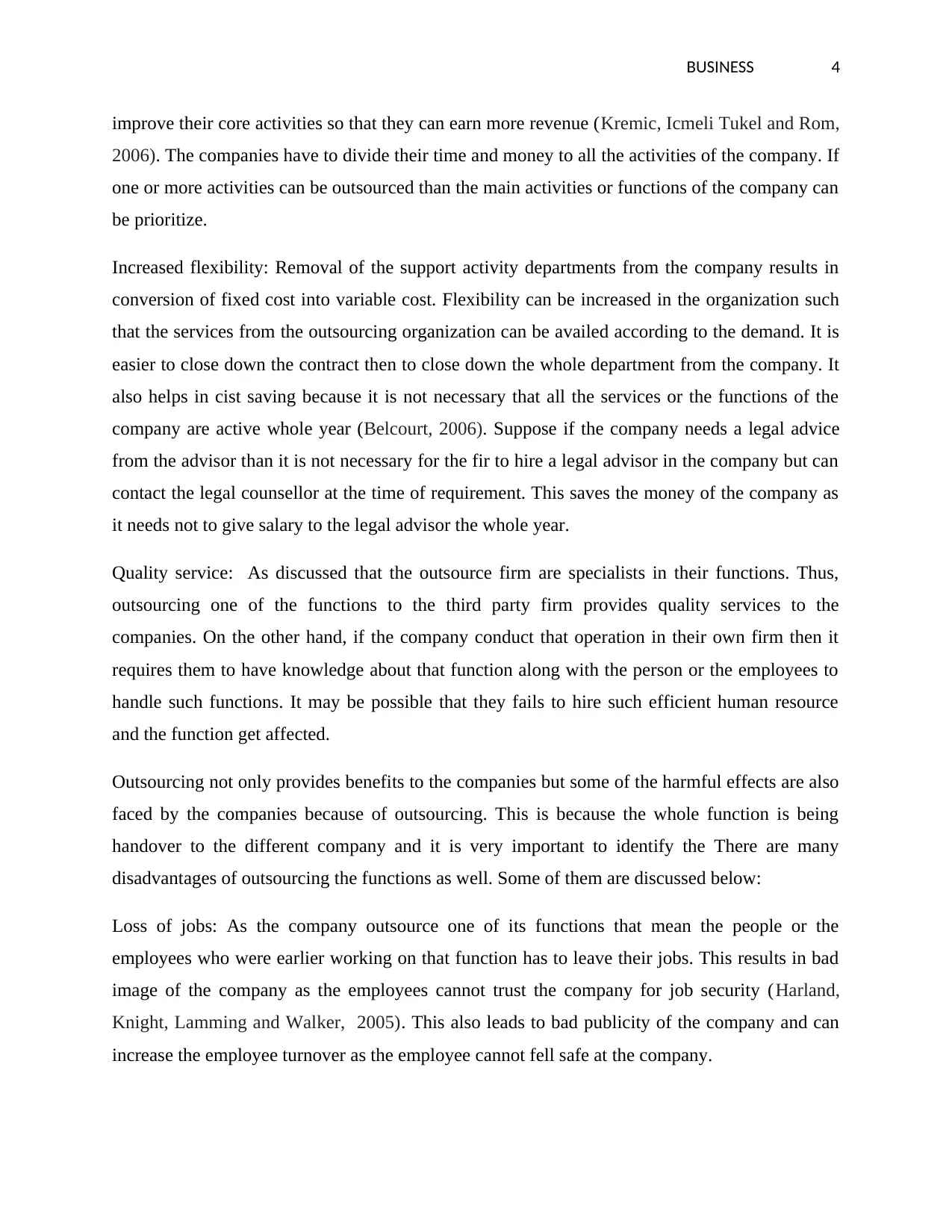
BUSINESS 4
improve their core activities so that they can earn more revenue (Kremic, Icmeli Tukel and Rom,
2006). The companies have to divide their time and money to all the activities of the company. If
one or more activities can be outsourced than the main activities or functions of the company can
be prioritize.
Increased flexibility: Removal of the support activity departments from the company results in
conversion of fixed cost into variable cost. Flexibility can be increased in the organization such
that the services from the outsourcing organization can be availed according to the demand. It is
easier to close down the contract then to close down the whole department from the company. It
also helps in cist saving because it is not necessary that all the services or the functions of the
company are active whole year (Belcourt, 2006). Suppose if the company needs a legal advice
from the advisor than it is not necessary for the fir to hire a legal advisor in the company but can
contact the legal counsellor at the time of requirement. This saves the money of the company as
it needs not to give salary to the legal advisor the whole year.
Quality service: As discussed that the outsource firm are specialists in their functions. Thus,
outsourcing one of the functions to the third party firm provides quality services to the
companies. On the other hand, if the company conduct that operation in their own firm then it
requires them to have knowledge about that function along with the person or the employees to
handle such functions. It may be possible that they fails to hire such efficient human resource
and the function get affected.
Outsourcing not only provides benefits to the companies but some of the harmful effects are also
faced by the companies because of outsourcing. This is because the whole function is being
handover to the different company and it is very important to identify the There are many
disadvantages of outsourcing the functions as well. Some of them are discussed below:
Loss of jobs: As the company outsource one of its functions that mean the people or the
employees who were earlier working on that function has to leave their jobs. This results in bad
image of the company as the employees cannot trust the company for job security (Harland,
Knight, Lamming and Walker, 2005). This also leads to bad publicity of the company and can
increase the employee turnover as the employee cannot fell safe at the company.
improve their core activities so that they can earn more revenue (Kremic, Icmeli Tukel and Rom,
2006). The companies have to divide their time and money to all the activities of the company. If
one or more activities can be outsourced than the main activities or functions of the company can
be prioritize.
Increased flexibility: Removal of the support activity departments from the company results in
conversion of fixed cost into variable cost. Flexibility can be increased in the organization such
that the services from the outsourcing organization can be availed according to the demand. It is
easier to close down the contract then to close down the whole department from the company. It
also helps in cist saving because it is not necessary that all the services or the functions of the
company are active whole year (Belcourt, 2006). Suppose if the company needs a legal advice
from the advisor than it is not necessary for the fir to hire a legal advisor in the company but can
contact the legal counsellor at the time of requirement. This saves the money of the company as
it needs not to give salary to the legal advisor the whole year.
Quality service: As discussed that the outsource firm are specialists in their functions. Thus,
outsourcing one of the functions to the third party firm provides quality services to the
companies. On the other hand, if the company conduct that operation in their own firm then it
requires them to have knowledge about that function along with the person or the employees to
handle such functions. It may be possible that they fails to hire such efficient human resource
and the function get affected.
Outsourcing not only provides benefits to the companies but some of the harmful effects are also
faced by the companies because of outsourcing. This is because the whole function is being
handover to the different company and it is very important to identify the There are many
disadvantages of outsourcing the functions as well. Some of them are discussed below:
Loss of jobs: As the company outsource one of its functions that mean the people or the
employees who were earlier working on that function has to leave their jobs. This results in bad
image of the company as the employees cannot trust the company for job security (Harland,
Knight, Lamming and Walker, 2005). This also leads to bad publicity of the company and can
increase the employee turnover as the employee cannot fell safe at the company.
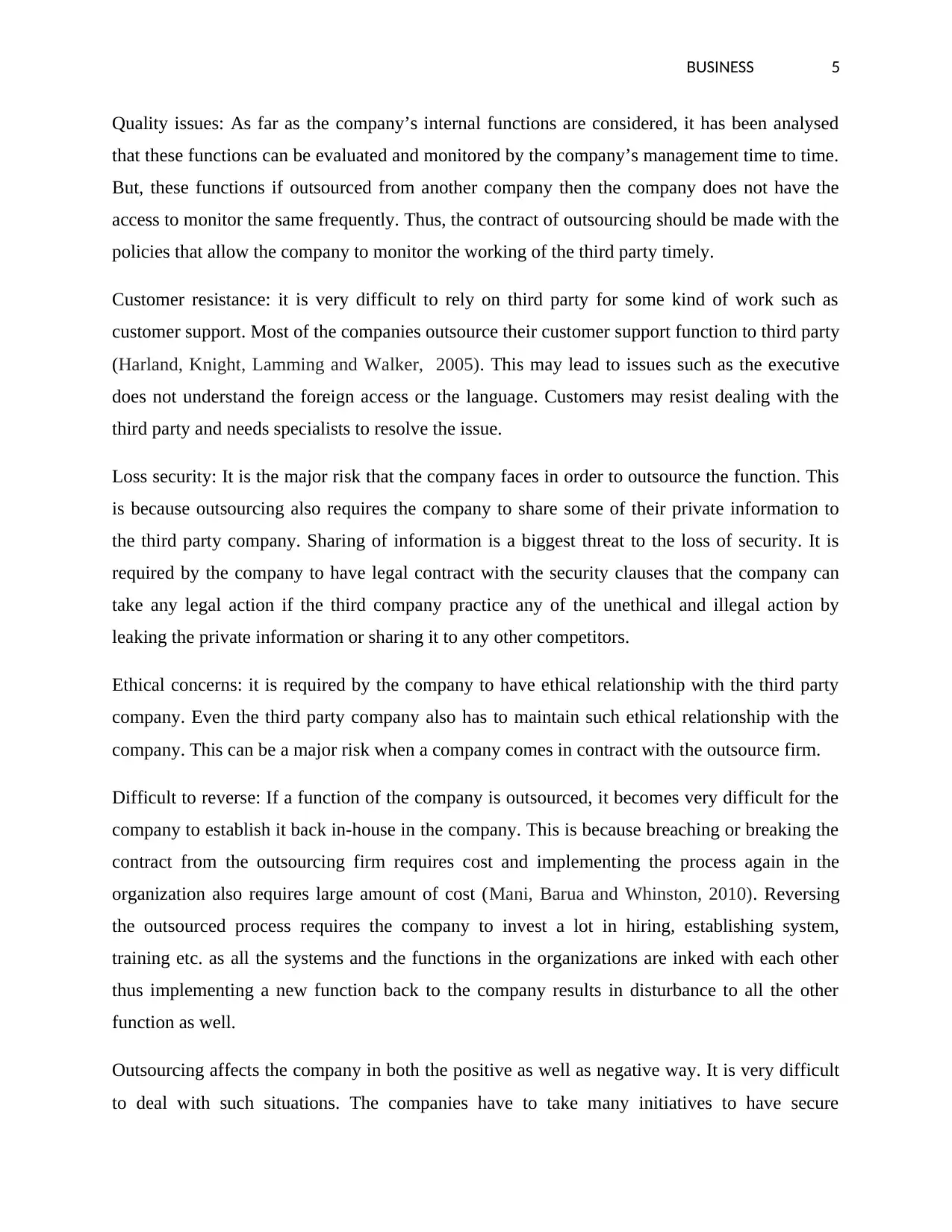
BUSINESS 5
Quality issues: As far as the company’s internal functions are considered, it has been analysed
that these functions can be evaluated and monitored by the company’s management time to time.
But, these functions if outsourced from another company then the company does not have the
access to monitor the same frequently. Thus, the contract of outsourcing should be made with the
policies that allow the company to monitor the working of the third party timely.
Customer resistance: it is very difficult to rely on third party for some kind of work such as
customer support. Most of the companies outsource their customer support function to third party
(Harland, Knight, Lamming and Walker, 2005). This may lead to issues such as the executive
does not understand the foreign access or the language. Customers may resist dealing with the
third party and needs specialists to resolve the issue.
Loss security: It is the major risk that the company faces in order to outsource the function. This
is because outsourcing also requires the company to share some of their private information to
the third party company. Sharing of information is a biggest threat to the loss of security. It is
required by the company to have legal contract with the security clauses that the company can
take any legal action if the third company practice any of the unethical and illegal action by
leaking the private information or sharing it to any other competitors.
Ethical concerns: it is required by the company to have ethical relationship with the third party
company. Even the third party company also has to maintain such ethical relationship with the
company. This can be a major risk when a company comes in contract with the outsource firm.
Difficult to reverse: If a function of the company is outsourced, it becomes very difficult for the
company to establish it back in-house in the company. This is because breaching or breaking the
contract from the outsourcing firm requires cost and implementing the process again in the
organization also requires large amount of cost (Mani, Barua and Whinston, 2010). Reversing
the outsourced process requires the company to invest a lot in hiring, establishing system,
training etc. as all the systems and the functions in the organizations are inked with each other
thus implementing a new function back to the company results in disturbance to all the other
function as well.
Outsourcing affects the company in both the positive as well as negative way. It is very difficult
to deal with such situations. The companies have to take many initiatives to have secure
Quality issues: As far as the company’s internal functions are considered, it has been analysed
that these functions can be evaluated and monitored by the company’s management time to time.
But, these functions if outsourced from another company then the company does not have the
access to monitor the same frequently. Thus, the contract of outsourcing should be made with the
policies that allow the company to monitor the working of the third party timely.
Customer resistance: it is very difficult to rely on third party for some kind of work such as
customer support. Most of the companies outsource their customer support function to third party
(Harland, Knight, Lamming and Walker, 2005). This may lead to issues such as the executive
does not understand the foreign access or the language. Customers may resist dealing with the
third party and needs specialists to resolve the issue.
Loss security: It is the major risk that the company faces in order to outsource the function. This
is because outsourcing also requires the company to share some of their private information to
the third party company. Sharing of information is a biggest threat to the loss of security. It is
required by the company to have legal contract with the security clauses that the company can
take any legal action if the third company practice any of the unethical and illegal action by
leaking the private information or sharing it to any other competitors.
Ethical concerns: it is required by the company to have ethical relationship with the third party
company. Even the third party company also has to maintain such ethical relationship with the
company. This can be a major risk when a company comes in contract with the outsource firm.
Difficult to reverse: If a function of the company is outsourced, it becomes very difficult for the
company to establish it back in-house in the company. This is because breaching or breaking the
contract from the outsourcing firm requires cost and implementing the process again in the
organization also requires large amount of cost (Mani, Barua and Whinston, 2010). Reversing
the outsourced process requires the company to invest a lot in hiring, establishing system,
training etc. as all the systems and the functions in the organizations are inked with each other
thus implementing a new function back to the company results in disturbance to all the other
function as well.
Outsourcing affects the company in both the positive as well as negative way. It is very difficult
to deal with such situations. The companies have to take many initiatives to have secure
⊘ This is a preview!⊘
Do you want full access?
Subscribe today to unlock all pages.

Trusted by 1+ million students worldwide
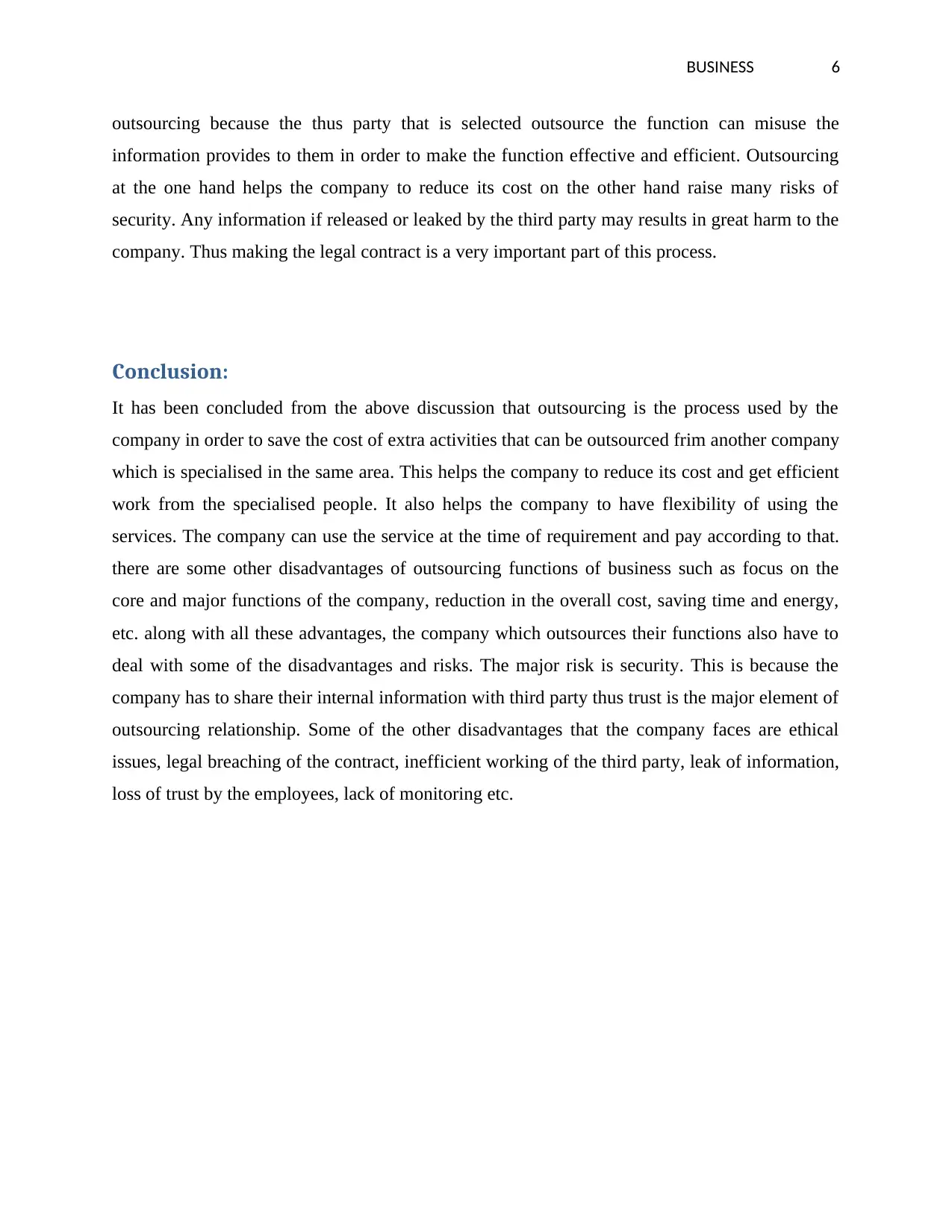
BUSINESS 6
outsourcing because the thus party that is selected outsource the function can misuse the
information provides to them in order to make the function effective and efficient. Outsourcing
at the one hand helps the company to reduce its cost on the other hand raise many risks of
security. Any information if released or leaked by the third party may results in great harm to the
company. Thus making the legal contract is a very important part of this process.
Conclusion:
It has been concluded from the above discussion that outsourcing is the process used by the
company in order to save the cost of extra activities that can be outsourced frim another company
which is specialised in the same area. This helps the company to reduce its cost and get efficient
work from the specialised people. It also helps the company to have flexibility of using the
services. The company can use the service at the time of requirement and pay according to that.
there are some other disadvantages of outsourcing functions of business such as focus on the
core and major functions of the company, reduction in the overall cost, saving time and energy,
etc. along with all these advantages, the company which outsources their functions also have to
deal with some of the disadvantages and risks. The major risk is security. This is because the
company has to share their internal information with third party thus trust is the major element of
outsourcing relationship. Some of the other disadvantages that the company faces are ethical
issues, legal breaching of the contract, inefficient working of the third party, leak of information,
loss of trust by the employees, lack of monitoring etc.
outsourcing because the thus party that is selected outsource the function can misuse the
information provides to them in order to make the function effective and efficient. Outsourcing
at the one hand helps the company to reduce its cost on the other hand raise many risks of
security. Any information if released or leaked by the third party may results in great harm to the
company. Thus making the legal contract is a very important part of this process.
Conclusion:
It has been concluded from the above discussion that outsourcing is the process used by the
company in order to save the cost of extra activities that can be outsourced frim another company
which is specialised in the same area. This helps the company to reduce its cost and get efficient
work from the specialised people. It also helps the company to have flexibility of using the
services. The company can use the service at the time of requirement and pay according to that.
there are some other disadvantages of outsourcing functions of business such as focus on the
core and major functions of the company, reduction in the overall cost, saving time and energy,
etc. along with all these advantages, the company which outsources their functions also have to
deal with some of the disadvantages and risks. The major risk is security. This is because the
company has to share their internal information with third party thus trust is the major element of
outsourcing relationship. Some of the other disadvantages that the company faces are ethical
issues, legal breaching of the contract, inefficient working of the third party, leak of information,
loss of trust by the employees, lack of monitoring etc.
Paraphrase This Document
Need a fresh take? Get an instant paraphrase of this document with our AI Paraphraser
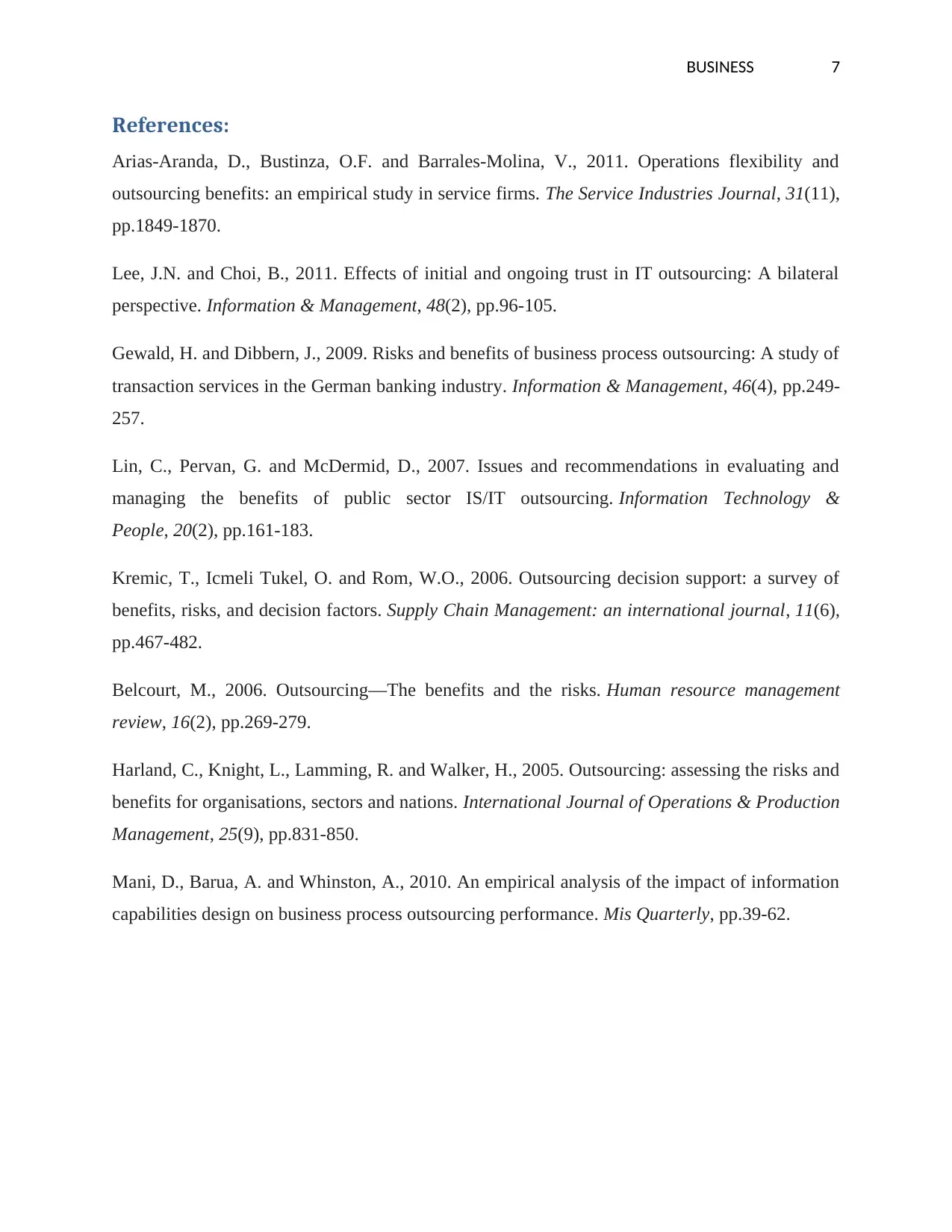
BUSINESS 7
References:
Arias-Aranda, D., Bustinza, O.F. and Barrales-Molina, V., 2011. Operations flexibility and
outsourcing benefits: an empirical study in service firms. The Service Industries Journal, 31(11),
pp.1849-1870.
Lee, J.N. and Choi, B., 2011. Effects of initial and ongoing trust in IT outsourcing: A bilateral
perspective. Information & Management, 48(2), pp.96-105.
Gewald, H. and Dibbern, J., 2009. Risks and benefits of business process outsourcing: A study of
transaction services in the German banking industry. Information & Management, 46(4), pp.249-
257.
Lin, C., Pervan, G. and McDermid, D., 2007. Issues and recommendations in evaluating and
managing the benefits of public sector IS/IT outsourcing. Information Technology &
People, 20(2), pp.161-183.
Kremic, T., Icmeli Tukel, O. and Rom, W.O., 2006. Outsourcing decision support: a survey of
benefits, risks, and decision factors. Supply Chain Management: an international journal, 11(6),
pp.467-482.
Belcourt, M., 2006. Outsourcing—The benefits and the risks. Human resource management
review, 16(2), pp.269-279.
Harland, C., Knight, L., Lamming, R. and Walker, H., 2005. Outsourcing: assessing the risks and
benefits for organisations, sectors and nations. International Journal of Operations & Production
Management, 25(9), pp.831-850.
Mani, D., Barua, A. and Whinston, A., 2010. An empirical analysis of the impact of information
capabilities design on business process outsourcing performance. Mis Quarterly, pp.39-62.
References:
Arias-Aranda, D., Bustinza, O.F. and Barrales-Molina, V., 2011. Operations flexibility and
outsourcing benefits: an empirical study in service firms. The Service Industries Journal, 31(11),
pp.1849-1870.
Lee, J.N. and Choi, B., 2011. Effects of initial and ongoing trust in IT outsourcing: A bilateral
perspective. Information & Management, 48(2), pp.96-105.
Gewald, H. and Dibbern, J., 2009. Risks and benefits of business process outsourcing: A study of
transaction services in the German banking industry. Information & Management, 46(4), pp.249-
257.
Lin, C., Pervan, G. and McDermid, D., 2007. Issues and recommendations in evaluating and
managing the benefits of public sector IS/IT outsourcing. Information Technology &
People, 20(2), pp.161-183.
Kremic, T., Icmeli Tukel, O. and Rom, W.O., 2006. Outsourcing decision support: a survey of
benefits, risks, and decision factors. Supply Chain Management: an international journal, 11(6),
pp.467-482.
Belcourt, M., 2006. Outsourcing—The benefits and the risks. Human resource management
review, 16(2), pp.269-279.
Harland, C., Knight, L., Lamming, R. and Walker, H., 2005. Outsourcing: assessing the risks and
benefits for organisations, sectors and nations. International Journal of Operations & Production
Management, 25(9), pp.831-850.
Mani, D., Barua, A. and Whinston, A., 2010. An empirical analysis of the impact of information
capabilities design on business process outsourcing performance. Mis Quarterly, pp.39-62.
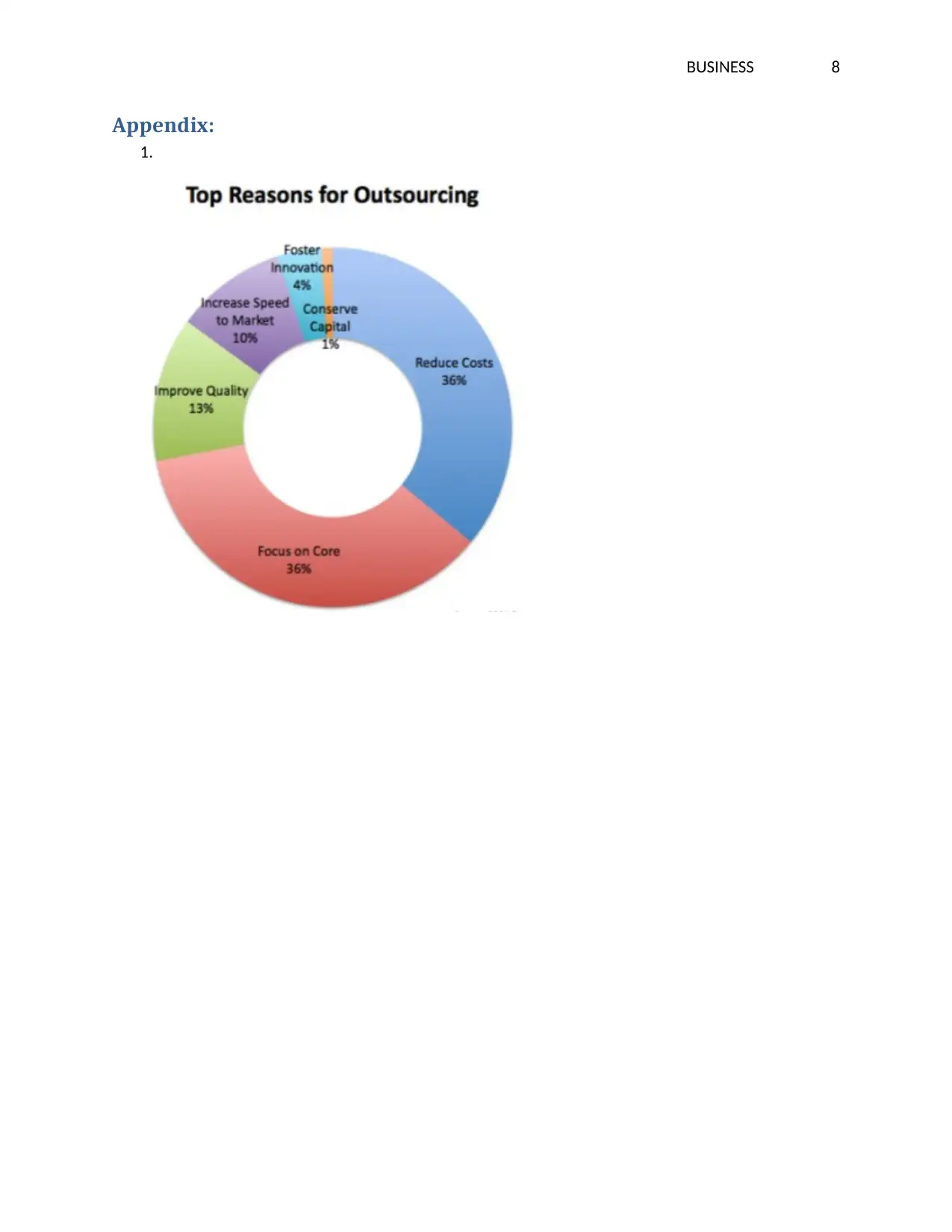
BUSINESS 8
Appendix:
1.
Appendix:
1.
⊘ This is a preview!⊘
Do you want full access?
Subscribe today to unlock all pages.

Trusted by 1+ million students worldwide
1 out of 9
Related Documents
Your All-in-One AI-Powered Toolkit for Academic Success.
+13062052269
info@desklib.com
Available 24*7 on WhatsApp / Email
![[object Object]](/_next/static/media/star-bottom.7253800d.svg)
Unlock your academic potential
Copyright © 2020–2026 A2Z Services. All Rights Reserved. Developed and managed by ZUCOL.




